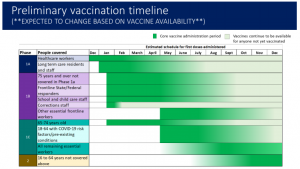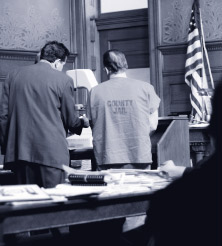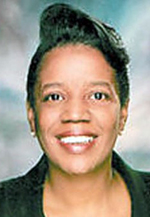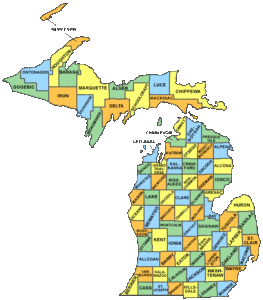Four-year terms headline MAC’s legislative priorities for year
 A state law authorizing four-year terms for county commissioners tops the legislative priorities list issued by the Michigan Association of Counties this week.
A state law authorizing four-year terms for county commissioners tops the legislative priorities list issued by the Michigan Association of Counties this week.
“We made it further than we ever have in Lansing on 4-year terms in the 100th Legislature,” said Deena Bosworth, director of governmental affairs, “so we enter the 101st Legislature with optimism that we will succeed now.”
Michigan is among just five states with two-year terms on all commissioners. As MAC Board Member Jim Storey of Allegan County testified before the last Legislature, “As the scope of services has expanded and deepened, the tasks expected of commissioners have also grown. When Boards of Supervisors were the norm, the primary task was adopting an annual budget and ensuring tax collection. … In short, the administrative-legislative function exercised by county government, as the Citizens Research Council observed, is far more complex and detailed than when Michigan’s founders set up our current system of local government.”
Other goals for the year are:
- Enacting Reforms to Improve the Functioning of Local Courts
- Bolstering Michigan’s System of Financing Local Government
- Ensuring the State Covers Costs for Property Tax Exemptions
- Adopting Measures to Reverse Damage Inflicted by “Dark Stores”
- Addressing Roads, Underground Infrastructure and Threats to Michigan’s Waters and Shorelines
- Bolstering Michigan’s Human Services Programs
Once bills are “dropped” with the Legislature for work in these areas, MAC will be issuing a list of Action Items and digital advocacy campaigns for members to use in contacting their lawmakers.
Annual priorities are developed in accordance with MAC’s policy platforms. For more information on MAC’s policy plans, contact Deena Bosworth at bosworth@micounties.org.
State releases ‘dine safely’ guide in advance of Feb. 1 restart for indoor dining
 The Michigan Department of Health and Human Services (MDHHS) released its next epidemic order which will go into effect on Monday, Feb. 1 and will last three weeks, until Sunday, Feb. 21, which includes provisions for indoor dining.
The Michigan Department of Health and Human Services (MDHHS) released its next epidemic order which will go into effect on Monday, Feb. 1 and will last three weeks, until Sunday, Feb. 21, which includes provisions for indoor dining.
In addition to dining indoors with certain restrictions, the order allows for concessions at casinos, movie theaters and stadiums; personal services requiring mask removal; and non-residential gatherings of up to 10 people from two households.
See links below for additional details and resources:
- January 22 – Gatherings and Face Mask Order
- Gathering Guidelines infographic
- Dine Safely Guide
- Stay Safe & Healthy in the Pandemic Guide
- Indoor Dining Guidelines Infographic
As always, visit MAC’s COVID-19 Resources Page for the latest news.
MAC policy committees staffed with members from 44 counties
 MAC’s six policy committees will have members from at least 44 of Michigan’s 83 counties after MAC Board President Veronica Klinefelt of Macomb County approved appointments for 2021 this week.
MAC’s six policy committees will have members from at least 44 of Michigan’s 83 counties after MAC Board President Veronica Klinefelt of Macomb County approved appointments for 2021 this week.
“The level of participation in the committees this year is inspiring,” said Deena Bosworth, MAC’s director of governmental affairs. “We have a diverse group of commissioners representing all regions of our state. This level of engagement is essential for us to effectively represent county interests in Lansing.”
All committees will meet virtually for the first half of 2021, while MAC considers whether to make virtual sessions permanent.
Committee sessions start at the end of January with our Judiciary Committee. All others will begin in February. Visit MAC’s digital events calendar for dates and times.
Committee meetings are designed to brief members on key issues, discuss pending legislation and, of course, prep changes to the association’s policy platforms for review by the MAC Board in June and by membership at the Annual Conference. Committees generally meet between February and May and September and October.
For more information on committee work, contact Deena Bosworth at bosworth@micounties.org.
Legislature unveils new committee assignments
 Legislative committees were announced this week by the 101st Legislature.
Legislative committees were announced this week by the 101st Legislature.
The House is currently divided between 58 Republicans and 52 Democrats. Members serving on the House Appropriations Committee, led by Rep. Thomas Albert (R-Kent), include seven former county commissioners, included a former MAC Board president, Rep. Ken Borton (R-Otsego).
Chairing the committee on Local Government and Municipal Finance is Ionia’s Rep. Julie Calley (R-Ionia). Calley is a former Ionia County commissioner. Rep. Robert Bezotte (R-Livingston) will serve as vice chair of the committee in his first year elected to the House, with Rep. Jim Ellison (D-Oakland) as minority vice chair.
Rep. Graham Filler (R-Clinton) will maintain his post on the Judiciary Committee. Rep. David LaGrand (D-Kent) will stay as the minority vice chair.
Rep. Jim Lilly (R-Oakland) will lead Rules and Competitiveness as chair, with Rep. Sarah Anthony (D-Ingham) as minority vice chair.
Other notable policy committee chairs include:
- Health Policy – Rep. Bronna Kahle (R-Lenawee)
- Elections and Ethics – Rep. Ann Bollin (R-Livingston)
- Natural Resources and Outdoor Recreation – Rep. Gary Howell (R-Lapeer)
- Tax Policy – Rep. Matt Hall (R-Calhoun)
- Transportation -Rep. Jack O’Malley (R-Benzie)
The full committee list can be found here.
Serving as lead to the General Government subcommittee, charged with budgeting revenue sharing each year, is Rep. Greg VanWoerkom (R-Muskegon). The new appropriations subcommittee list can be found here.
Senate announced earlier this year some policy committee changes, including Sen. Roger Victory (R-Ottawa) as chair of the Judiciary Committee, replacing Peter Lucido, who left for the post as Macomb County prosecutor. Senate appropriations subcommittees are expected to be announced next week.
The Senate is split 20-16 in favor of Republicans, with two vacancies to be filled later this year.
The legislative chambers are finishing their organizational work in advance of Gov. Gretchen Whitmer’s State of the State address on Jan. 27 and her fiscal 2022 budget proposal in early February.
Whitmer plan would spend $5.6 billion
 At a press conference held Tuesday afternoon, Gov. Gretchen Whitmer unveiled a COVID Recovery Plan that outlines $5.6 billion in overall spending, including a request to use about $274 million from the state’s General Fund, which the Legislature would have to approve.
At a press conference held Tuesday afternoon, Gov. Gretchen Whitmer unveiled a COVID Recovery Plan that outlines $5.6 billion in overall spending, including a request to use about $274 million from the state’s General Fund, which the Legislature would have to approve.
The spending boost would come from three buckets:
- $274 million from the General Fund, bolstered by stronger than expected revenues in recent months
- $309 million from the state School Aid Fund,
- $5 billion in federal funds coming from COVID-19 relief packages
During the Q&A portion of the event, the governor said it would take two years to each vaccination goals based on the present pace, though she is confident the incoming Biden administration will accelerate the delivery of more vaccines.
NACo resets Legislative Conference to virtual events in March
 Registration is now open for the 2021 National Association of Counties (NACo) Legislative Conference. The event will take place virtually over several days throughout March, with bonus content throughout April. Check out the schedule overview and visit NACo.org/Leg for the latest updates and speaker additions.
Registration is now open for the 2021 National Association of Counties (NACo) Legislative Conference. The event will take place virtually over several days throughout March, with bonus content throughout April. Check out the schedule overview and visit NACo.org/Leg for the latest updates and speaker additions.
- March 8-12: Policy Steering Committee Week
- March 17-19: Governance Meetings
- March 24-26: Workshops & Seminars
- March 31-April 1: CIO Forum
Michigan gets $363 million in federal aid for broadband work
 Michigan will get almost $363 million in federal funding over the next 10 years to expand broadband access to 249,263 sites statewide, officials of the Michigan Economic Development Corp. announced.
Michigan will get almost $363 million in federal funding over the next 10 years to expand broadband access to 249,263 sites statewide, officials of the Michigan Economic Development Corp. announced.
The funding is being awarded through the Federal Communications Commission (FCC) Rural Digital Opportunity Fund Phase 1 auction.
Counties and municipalities continue to be excluded from participating in the granting process to help solve the longstanding rural broadband accessibility. However, the full list of company awards can be found here.
Additionally, the interactive broadband map from Connected Nation Michigan is excellent tool if you want to see what parts of the state receive internet service and the type of service provided.
Webinars aimed at jail, public safety practices
 County leaders are invited to participate in two upcoming webinars on jail and public safety practices in Michigan, offered by Wayne State University’s Center for Behavioral Health and Justice.
County leaders are invited to participate in two upcoming webinars on jail and public safety practices in Michigan, offered by Wayne State University’s Center for Behavioral Health and Justice.
Mitigating COVID-19 in Jail Settings Community of Practice Webinar – Jail Policies and Procedures for COVID-19 and Beyond
Thursday, Jan. 28, 2021, 1 p.m. to 2 p.m.
COVID-19 Mitigation Strategies in Jail Settings Community of Practice webinar is the second of a monthly series that aims to contribute to the mitigation of COVID-19 in jail and other incarceration settings. The January event will provide an overview of jail facilities, especially for public health professionals to learn more about general and COVID-19 specific jail facility processes and policies and will feature facilitated discussions with stakeholders from across the country while highlighting COVID-19 mitigation strategies in jail settings with key personnel. To learn more about the COVID-19 Mitigation Strategies in Jail Settings, visit the toolkit.
Juvenile Justice in Michigan: What’s Next?
Thursday, Feb. 11, 2021, 1 p.m. to 2:30 p.m.
In 2020, the National Juvenile Defender Center issued the report “Overdue for Justice: An Assessment of Access to and Quality of Juvenile Defense Counsel in Michigan.” Join us as we discuss the report findings, the landscape of juvenile defense in our state, system reform priorities, and next steps toward improving access to justice for Michigan’s children.
This event is hosted by the State Appellate Defender Office (SADO) and is proudly co-sponsored by the Center for Behavioral Health and Justice.
 Staff picks
Staff picks
- The Supreme Court decision that saved the states billions (Governing magazine)
- 10 animal Twitter accounts that will improve your life (outsideonline.com)
- Michigan among 16 states showing population decline in census estimates (Route Fifty)
- Majorities say they don’t have enough information about when, where to get COVID-19 vaccine (Kaiser Family Foundation)

 State leaders announced this week
State leaders announced this week  A huge legislative package of reforms suggested by a joint county-state task force on jail policies was signed into law recently by Gov. Gretchen Whitmer.
A huge legislative package of reforms suggested by a joint county-state task force on jail policies was signed into law recently by Gov. Gretchen Whitmer. A push by the retail giant Meijer for a sales, use and Personal Property Tax (PPT) exemption for large retailers who are installing and utilizing automation equipment to assist with their distribution systems failed this week after the clock ran out for Gov. Gretchen Whitmer to sign it, thereby creating a “pocket vote.”
A push by the retail giant Meijer for a sales, use and Personal Property Tax (PPT) exemption for large retailers who are installing and utilizing automation equipment to assist with their distribution systems failed this week after the clock ran out for Gov. Gretchen Whitmer to sign it, thereby creating a “pocket vote.” Solar equipment tax bill rejected by governor
Solar equipment tax bill rejected by governor Legislative chambers release session calendars for 2021
Legislative chambers release session calendars for 2021 County officials are invited to attend a kickoff meeting led by the Federal Aviation Administration (FAA) on new rules governing the use of drones.
County officials are invited to attend a kickoff meeting led by the Federal Aviation Administration (FAA) on new rules governing the use of drones. Ottawa County Administrator Al Vanderberg was recently named a recipient of the
Ottawa County Administrator Al Vanderberg was recently named a recipient of the  The U.S. Treasury just released information for the new $25 billion emergency rental assistance program authorized under the
The U.S. Treasury just released information for the new $25 billion emergency rental assistance program authorized under the  A
A  With the House session delayed due to COVID positive cases (see below), a bill to extend the “no reason” option for virtual local board meetings remains stuck on the House floor.
With the House session delayed due to COVID positive cases (see below), a bill to extend the “no reason” option for virtual local board meetings remains stuck on the House floor.
 MAC Executive Director Stephan Currie led the Podcast 83 team through a review of legislative activity as 2020 comes to a close in the latest episode of Podcast 83 on Dec. 7.
MAC Executive Director Stephan Currie led the Podcast 83 team through a review of legislative activity as 2020 comes to a close in the latest episode of Podcast 83 on Dec. 7. The Michigan Indigent Defense Commission (MIDC) will hold its final meeting of 2020 on Dec. 15 starting at 9 a.m. (
The Michigan Indigent Defense Commission (MIDC) will hold its final meeting of 2020 on Dec. 15 starting at 9 a.m. ( For the better part of 2020, the House and the Senate have been working on a bill to forgive the penalties and interest for those who could not afford to make their summer property tax payments.
For the better part of 2020, the House and the Senate have been working on a bill to forgive the penalties and interest for those who could not afford to make their summer property tax payments. Wayne County Commissioner Jewel Ware died unexpectedly this week from a heart attack.
Wayne County Commissioner Jewel Ware died unexpectedly this week from a heart attack. Protect your work environment and increase peace of mind for you and your team. Join MAC, CoPro+ and SPACE for a short webinar to help you and your employees “Stay Safe, Stay Working and Move Forward.” The webinar will run from 3:30 p.m. to 5 p.m. Eastern on Thursday, Dec. 17.
Protect your work environment and increase peace of mind for you and your team. Join MAC, CoPro+ and SPACE for a short webinar to help you and your employees “Stay Safe, Stay Working and Move Forward.” The webinar will run from 3:30 p.m. to 5 p.m. Eastern on Thursday, Dec. 17. In the latest Treasury webinar in a series co-sponsored by MAC and others, state experts detailed projections for the economy in 2021 and 2022, emphasizing that a rebound in those years should be robust from the effects of the coronavirus pandemic.
In the latest Treasury webinar in a series co-sponsored by MAC and others, state experts detailed projections for the economy in 2021 and 2022, emphasizing that a rebound in those years should be robust from the effects of the coronavirus pandemic. In another special LIVE video edition of Podcast 83 at 3 p.m. on Dec. 7, MAC’s Executive Director Stephan Currie and MAC’s advocacy team will discuss the ongoing “lame duck” session of the Michigan Legislature.
In another special LIVE video edition of Podcast 83 at 3 p.m. on Dec. 7, MAC’s Executive Director Stephan Currie and MAC’s advocacy team will discuss the ongoing “lame duck” session of the Michigan Legislature. Bills that would extend a poverty exemption to the payment of property taxes by overburdened homeowners advanced out of House and Senate committees this week.
Bills that would extend a poverty exemption to the payment of property taxes by overburdened homeowners advanced out of House and Senate committees this week. In a live webinar on Friday, Dec. 11, county leaders can gain the knowledge and skills required to provide effective, equitable service to people with intellectual and/or developmental disabilities, including autism spectrum disorder.
In a live webinar on Friday, Dec. 11, county leaders can gain the knowledge and skills required to provide effective, equitable service to people with intellectual and/or developmental disabilities, including autism spectrum disorder.
 The House Health Policy Committee took testimony this week on a Republican plan to set criteria for COVID responses on the local level. Rep. Ben Frederick (R-Shiawassee) testified on
The House Health Policy Committee took testimony this week on a Republican plan to set criteria for COVID responses on the local level. Rep. Ben Frederick (R-Shiawassee) testified on  In partnership with the Michigan Association of Counties and others, the Michigan Department of Treasury will hold its eighth joint webinar, “COVID-19 Updates and Resources for Local Governments,” at 2 p.m. on Tuesday, Nov. 10.
In partnership with the Michigan Association of Counties and others, the Michigan Department of Treasury will hold its eighth joint webinar, “COVID-19 Updates and Resources for Local Governments,” at 2 p.m. on Tuesday, Nov. 10.